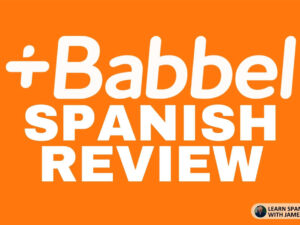Conocer Conjugation Chart & Full Tense Guide

Conocer Conjugation Chart & Full Tense Guide
“Conocer,” means “to know someone” or “to be familiar with”. It is one of the essential verbs in Spanish, important for expressing familiarity and acquaintance in various contexts.
This verb falls into the category of irregular verbs and requires a specific stem change and verbs ending for certain forms.
I’m James, from Learn Spanish With James, and within this comprehensive guide to ”conocer” conjugation patterns you will find a complete verb chart for each of the various tenses in Spanish.
Irregular verbs like “conocer” may initially seem daunting, but with consistent practice and application, they can become as intuitive as regular ones.
Present Tense
Pronouns Pronombres
I yo conozco
you tú conoces
he,she,it, you(formal) él,ella,usted conoce
we nosotros,nosotras conocemos
you pl. vosotros, vosotras conocéis
they, you pl. (formal) ellos,ellas,ustedes conocen
When We Use the Present Tense
In Spanish, the present tense is used to describe actions that are happening right now or are habitual.
As mentioned, “conocer” is classified as an irregular verb. The verb stem is formed by removing the infinitive form ending -er, resulting in the stem conoc-.
However, in the first person form, there is a stem alteration to conozc-, as you will see in the “conocer” conjugation chart above, and within the example sentences below.
Top Tip: This rule also applies to “parecer” and “ofrecer“. Try to learn these too!
Examples of the Verb “Conocer” in the Present Tense:
- Yo conozco a María. (I know Maria.)
- Tú conoces el restaurante nuevo. (You know the new restaurant.)
- Él conoce bien la ciudad. (He knows the city well.)
- Nosotros conocemos a su familia. (We know his family.)
- Vosotros conocéis la historia. (You all know the story.)
- Ellos conocen la verdad. (They know the truth.)
Preterite Tense
Pronouns Pronombres
I yo conocí
you tú conociste
he, she. it, you (formal) él, ella, usted conoció
we nosotros, nosotras conocimos
you (plural) vosotros, vosotras conocisteis
they, you (pl. formal) ellos, ellas, ustedes conocieron
When We Use the Preterite Tense
The preterite tense is used to describe completed actions that occurred at a specific point in the past.
When we use this past tense for “conocer,” we typically refer to specific instances or events in the past when someone met or became acquainted with someone or something.
Examples of the Spanish Verb “Conocer” in the Preterite Tense
- Yo conocí a tu hermano ayer. (I met your brother yesterday.)
- Tú conociste ese lugar el verano pasado. (You visited that place last summer.)
- Él conoció a su esposa en la universidad. (He met his wife in college.)
- Nosotros conocimos al presidente en la conferencia. (We met the president at the conference.)
- Vosotros conocisteis la noticia hace una semana. (You all heard the news a week ago.)
- Ellos conocieron el resultado del examen. (They found out the exam result.)
Imperfect Tense
Pronouns Pronombres
I yo conocía
you tú conocías
he, she, it, you (formal) él, ella, usted conocía
we nosotros, nosotras conocíamos
you (plural) vosotros, vosotras conocíais
they, you(pl. formal) ellos, ellas, ustedes conocían
When We Use the Imperfect Tense
The imperfect tense describes past actions that were ongoing, habitual, or continuous.
In the context of “conocer”, the translation in the imperfect tense is “used to know” or “was knowing”.
As you should be able to recognise from the translations, this tense portrays past actions that were repeated or ongoing without emphasizing a specific endpoint.
Examples of Imperfect “Conocer” Conjugation
- Yo conocía la ciudad muy bien. (I knew the city very well.)
- Tú conocías a mi abuela cuando éramos niños. (You knew my grandmother when we were children.)
- Él conocía a todos los vecinos. (He knew all the neighbors.)
- Nosotros conocíamos ese restaurante desde hacía años. (We knew that restaurant for years.)
- Vosotros conocíais la historia de memoria. (You all knew the story by heart.)
- Ellos conocían el secreto. (They knew the secret.)
Future Tense
Pronouns Pronombres
I yo conoceré
you tú conocerás
he,she,it, you(formal) él,ella,usted conocerá
we nosotros,nosotras conoceremos
you pl. vosotros, vosotras conoceréis
they, you pl. (formal) ellos,ellas,ustedes conocerán
When We Use the Future Tense
The future tense is used to describe actions that will happen in the future.
This is not a difficult tense to learn. All we need to do is learn the endings and place them on the end of the infinitive verb form.
With the Spanish verb “conocer”, the future tense refers to a time when somebody is supposed to meet another person or learn something new at a certain point in the future.
Examples of the Future Tense “Conocer” Conjugation
- Yo conoceré a tu novio pronto. (I will meet your boyfriend soon.)
- Tú conocerás la verdad algún día. (You will know the truth someday.)
- Él conocerá nuevos lugares en su viaje. (He will discover new places on his trip.)
- Nosotros conoceremos a tus padres en la fiesta. (We will meet your parents at the party.)
- Vosotros conoceréis más sobre el tema después. (You all will learn more about the topic later.)
- Ellos conocerán al ganador del concurso. (They will meet the contest winner.)
Conditional Tense
Pronouns Pronombres
I yo conocería
you tú conocerías
he,she,it, you(formal) él,ella,usted conocería
we nosotros,nosotras conoceríamos
you pl. vosotros, vosotras conoceríais
they, you pl. (formal) ellos,ellas,ustedes conocerían
When We Use the Conditional
The conditional tense is used to express what would happen under certain conditions or to convey polite requests or hypothetical situations.
When we use the conditional tense with “conocer” in Spanish, it typically denotes hypothetical situations or actions that would happen under certain conditions.
We can use this tense within the same sentence as the imperfect subjunctive. Doing so will also help you to achieve high marks in speaking exams.
Remember that this tense is often used to express politeness, make requests, or convey hypothetical scenarios.
Examples of the Conditional “Conocer” Conjugation
- Yo conocería más personas si saliera más. (I would meet more people if I went out more.)
- Tú conocerías la respuesta si estudiaras más. (You would know the answer if you studied more.)
- Él conocería otras culturas si viajara más. (He would know other cultures if he traveled more.)
- Nosotros conoceríamos mejor la ciudad si viviéramos aquí. (We would know the city better if we lived here.)
- Vosotros conoceríais más sobre el tema si leyerais libros al respecto. (You all would know more about the topic if you read books about it.)
- Ellos conocerían el resultado si preguntaran. (They would know the result if they asked.)
Perfect Tense
Pronouns Pronombres Auxiliary verb ‘haber’
I yo he conocido
you tú has conocido
he,she,it, you(formal) él,ella,usted ha conocido
we nosotros,nosotras hemos conocido
you pl. vosotros, vosotras habéis conocido
they, you pl. (formal) ellos,ellas,ustedes han conocido
When We Use the Perfect Tense
We use the perfect tense when we want to express actions that have been completed in the recent past.
When we use the perfect tense with “conocer” in Spanish, we indicate that actions that have been completed in the recent past.
The literal translation is “have known” or “have been acquainted with”.
In order to form “conocer” in the perfect tense, we need to conjugate “haber” and add the past participle “conocido.”
Do not confuse this with the gerund form, “conociendo” which means “knowing”.
Examples of the Perfect Tense “Conocer” Conjugation
- Yo he conocido a tu hermana. (I have met your sister.)
- Tú has conocido ese lugar antes. (You have visited that place before.)
- Él ha conocido a su ídolo. (He has met his idol.)
- Nosotros hemos conocido personas interesantes en el viaje. (We have met interesting people on the trip.)
- Vosotros habéis conocido la historia desde pequeños. (You all have known the story since childhood.)
- Ellos han conocido la noticia desde esta mañana. (They have known the news since this morning.)
Pluperfect Tense
Pronouns Pronombres Auxiliary verb ‘haber’
I yo había conocido
you tú habías conocido
he,she,it, you(formal) él,ella,usted había conocido
we nosotros,nosotras habíamos conocido
you pl. vosotros, vosotras habíais conocido
they, you pl. (formal) ellos,ellas,ustedes habían conocido
When We Use the Pluperfect Tense
When we use the pluperfect tense of “conocer” in Spanish, we indicate actions that had been completed before another action or point in the past.
So, the literal translation is “had known” or “had been acquainted with”.
When we want to form “conocer” in the pluperfect tense, we need to conjugate “haber” and add the past participle “conocido.”
Examples of the Pluperfect “Conocer” Conjugation
- Yo había conocido a tu primo antes de la fiesta. (I had met your cousin before the party.)
- Tú habías conocido a ese actor antes de ser famoso. (You had known that actor before he became famous.)
- Él había conocido a su mejor amigo desde la infancia. (He had known his best friend since childhood.)
- Nosotros habíamos conocido ese restaurante antes de mudarnos. (We had known that restaurant before moving.)
- Vosotros habíais conocido la noticia antes que nosotros. (You all had known the news before us.)
- Ellos habían conocido la verdad antes del juicio. (They had known the truth before the trial.)
Future Perfect Tense
Pronouns Pronombres Auxiliary verb ‘haber’
I yo habré conocido
you tú habrás conocido
he,she,it, you(formal) él,ella,usted habrá conocido
we nosotros,nosotras habremos conocido
you pl. vosotros, vosotras habréis conocido
they, you pl. (formal) ellos,ellas,ustedes habrán conocido
When We Use the Future Perfect Tense
We use the future perfect tense of “conocer” in Spanish to indicate actions that will have been completed by a specific point in the future.
This tense is employed to express instances where someone will have met or become acquainted with someone or something before a designated future event, emphasizing the completion of the action prior to that future moment.
Again, we need to use the verb “haber” and the past participle of “conocer” to create this tense.
Examples of the Future Perfect “Conocer” Conjugation
- Yo habré conocido a tu familia para Navidad. (I will have met your family by Christmas.)
- Tú habrás conocido todos los monumentos antes de irte. (You will have seen all the monuments before leaving.)
- Él habrá conocido muchas personas después del evento. (He will have met many people after the event.)
- Nosotros habremos conocido la respuesta para mañana. (We will have found out the answer by tomorrow.)
- Vosotros habréis conocido la ciudad entera antes de regresar a casa. (You all will have explored the entire city before returning home.)
- Ellos habrán conocido el resultado antes de que termine el día. (They will have known the result before the day ends.)
Conditional Perfect Tense
Pronouns Pronombres Auxiliary verb ‘haber’
I yo habría conocido
you tú habrías conocido
he,she,it, you(formal) él,ella,usted habría conocido
we nosotros,nosotras habríamos conocido
you pl. vosotros, vosotras habríais conocido
they, you pl. (formal) ellos,ellas,ustedes habrían conocido
When We Use the Conditional Perfect Tense
The conditional perfect tense expresses actions that would have been completed under certain conditions.
This tense is employed to express hypothetical situations or actions that would have occurred before a specified point in the past, emphasizing the completion of the action under those hypothetical circumstances.
Once again, we need to use the verb “haber” and the past participle of “conocer” to create this tense.
Examples of Conditional Perfect “Conocer” Conjugation
- Yo habría conocido más gente si hubiera salido anoche. (I would have met more people if I had gone out last night.)
- Tú habrías conocido el problema si hubieras estado aquí. (You would have known the problem if you had been here.)
- Él habría conocido a su ídolo si hubiera llegado temprano. (He would have met his idol if he had arrived early.)
- Nosotros habríamos conocido la verdad si nos hubieran contado. (We would have known the truth if they had told us.)
- Vosotros habríais conocido más sobre el tema si lo hubierais investigado. (You all would have known more about the topic if you had researched it.)
- Ellos habrían conocido la solución si hubieran preguntado. (They would have known the solution if they had asked.)
Present Subjunctive
Pronouns Pronombres
I yo conozca
you tú conozcas
he,she,it, you(formal) él,ella,usted conozca
we nosotros,nosotras conozcamos
you pl. vosotros, vosotras conozcáis
they, you pl. (formal) ellos,ellas,ustedes conozcan
When We Use the Present Subjunctive
The present subjunctive in Spanish is employed to express desires, doubts, or uncertainty about actions in the present or future.
This tense is very common in Spanish. It conveys wishes, doubts, or hypothetical situations regarding knowing or becoming acquainted with someone or something in the present or future.
Examples of the Present Subjunctive “Conocer” Conjugation
- Yo quiero que tú conozcas a mis amigos. (I want you to meet my friends.)
- Es importante que él conozca la verdad. (It’s important that he knows the truth.)
- Dudo que nosotros conozcamos al ganador. (I doubt that we know the winner.)
- Espero que vosotros conozcáis la respuesta. (I hope you all know the answer.)
- Ojalá que ellos conozcan el camino. (I hope they know the way.)
Imperfect Subjunctive
Pronouns Pronombres
I yo conociera, conociese
you tú conocieras, conocieses
he,she,it, you(formal) él,ella,usted conociera, conociese
we nosotros,nosotras conociéramos, conociésemos
you pl. vosotros, vosotras conocierais, conocieseis
they, you pl. (formal) ellos,ellas,ustedes conocieran, conociesen
When We Use the Imperfect Subjunctive
The imperfect subjunctive is used to express desires, doubts, or uncertainty about actions in the past.
As I mentioned earlier, you can use this tense in the same sentence as the conditional tense, which I am showing you below with the example sentences.
Examples of “Conocer” in the Imperfect Subjunctive
- Yo quería que tú conocieras a mi familia. (I wanted you to meet my family.)
- Dudaba que él conociera la respuesta. (I doubted that he knew the answer.)
- Esperábamos que nosotros conociéramos la ciudad juntos. (We hoped that we would explore the city together.)
- Ojalá que vosotros conocierais la verdad. (I wish you all knew the truth.)
- Era importante que ellos conocieran el plan. (It was important that they knew the plan.)
Affirmative Imperative
Pronouns Pronombres
you tú ¡conoce!
he,she,it, you(formal) él,ella,usted ¡conozca!
we nosotros,nosotras ¡conozcamos!
you pl. vosotros, vosotras ¡conoced!
they, you pl. (formal) ellos,ellas,ustedes ¡conozcan!
When We Use The Affirmative Imperative
The affirmative imperative in Spanish, used with “conocer,” is employed to give commands or orders and is used when instructing someone to meet or become acquainted with someone or something.
In honesty, it’s not a verb you would typically expect to see in the imperative form.
Nonetheless, here are the ”conocer” conjugations for the imperative mood in Spanish.
Examples of How to Conjugate “Conocer” in the Affirmative Imperative
- Tú: Conoce a mi amigo. (Meet my friend.)
- Usted: Conozca a este lugar. (Get to know this place.)
- Vosotros: Conoced la ciudad. (Explore the city.)
- Ustedes: Conozcan a su jefe. (Meet your boss.)
Negative Imperative
Pronouns Pronombres
you tú ¡no conozcas!
he,she,it, you(formal) él,ella,usted ¡no conozca!
we nosotros,nosotras ¡no conozcamos!
you pl. vosotros, vosotras ¡no conozcáis!
they, you pl. (formal) ellos,ellas,ustedes ¡no conozcan!
When We Use The Negative Imperative
The negative imperative Spanish verb conjugation for “conocer” is employed to give commands or orders in a negative manner, typically to forbid someone from meeting or becoming acquainted with someone or something.
Here are some examples of how to form the conjugated forms for irregular verbs like ”conocer” for this mood.
Examples of How to Conjugate “Conocer” in the Negative Imperative
- Tú: No conozcas a ese hombre. (Don’t meet that man.)
- Usted: No conozca ese barrio. (Don’t explore that neighborhood.)
- Vosotros: No conocáis a esa persona. (Don’t get to know that person.)
- Ustedes: No conozcan a ese grupo. (Don’t meet that group.)
Online Spanish Courses & Grammar Courses
For a full list of Beginner, Intermediate and Advanced Courses, check out this full list of online Spanish courses.
I put this list together myself, and it comprises a mixture of courses that offer Spanish grammar practice for all levels, conversational practice, listening and writing exercises in Spanish, free Spanish courses, and a whole lot more.
The fastest way to learn Spanish is to test a mixture of Spanish resources, including Spanish verb conjugation, and choose the course that coincides most with your learning style.
In addition to online Spanish courses, on this site you will find a wide range of Spanish podcasts, Spanish apps, Spanish YouTube channels, and both online and physical Spanish language schools.

About James – Or Should that be Santiago?
My name is James. I am a Brit with a love for the Spanish language. I have lived in Spain, Argentina, and Costa Rica, and I have been teaching Spanish for over a decade. This site will show you how to master the elements of Spanish grammar that often dishearten learners. I hope you enjoy the site and find it useful.
If you are interested in taking your Spanish to the next level, check out the Courses section for a full list of the Spanish courses I suggest. All reviews are based on my personal opinions.







